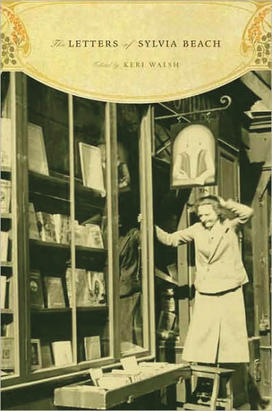The bookseller
With letters by Sylvia Beach, Keri Walsh *09 reveals the expatriate literary world in Paris

Beach’s letters, published in Keri Walsh *09’s edited collection, The Letters of Sylvia Beach, reveal the overlapping worlds of business, friendship, art, and international events that characterized the lives of modernism’s most celebrated writers as they came in and out of Paris — and her bookshop — in the 1920s and 1930s and after World War II.
Her correspondents included James Joyce, Gertrude Stein, Ernest Hemingway (who famously appeared in uniform to “liberate” Shakespeare and Company after the German defeat), the American painter Katherine Dudley, and Adrienne Monnier, Beach’s lifelong romantic partner, whose own bookshop, La Maison des Amis des Livres, inspired Beach to set up Shakespeare and Company across the street. The Letters of Sylvia Beach was published by Columbia University Press in April.
The letters, 265 in all, touch upon international events, such as “le krach americain,” as Beach referred to the 1929 stock market crash in a letter to Hemingway, but mostly delve into business, publishing, and dinner parties. She discusses, for example, her decision to publish Joyce’s Ulysses (which had been banned in the United States), a move she predicted to her sister “is going to make my place famous.” (It did.) The letters show her to be both playful and convincing. She was a woman who got what she wanted — many letters show her soliciting friends for money and favors for the shop. Beach wrote to a friend that you have to have a passion for books and authors in order to “grub and grub” in the “tiresome details” of running a bookstore.

Beach might have been an icon of cosmopolitan living, but she had roots in Princeton. Her father, Princeton Class of 1876, was a minister in town (Beach mentions Reunions in one letter), and she affectionately referred to her childhood home as “D.O.P.” for Dear Old Princeton. Many of her letters are stored in Firestone Library. Beach died in 1962 at the age of 75.
Walsh, an assistant professor of literature at Claremont McKenna College, embarked on the project after stumbling upon the current Shakespeare and Company (which is not Beach’s original, but named in honor of Beach’s store) in Paris before starting graduate study in English. “It sparked my imagination,” she says. Walsh designed the book both for scholars of modernism and for people “who simply love books, bookstores, and reading.”










1 Response
Stultz Roddenbery *77
10 Years AgoR.I.P. in D.O.P.
As a frequent traveler to Paris, I often walk past the Shakespeare and Company bookstore, named for Sylvia Beach’s original shop. The article on The Letters of Sylvia Beach by Keri Walsh *09 (Alumni Scene, July 7) points out that Miss Beach began her life in the place she called “D.O.P.” (Dear Old Princeton). She is spending eternity there as well. On a recent stroll through the Princeton Cemetery, I discovered her grave, with its modest tombstone engraved with only her name and dates.